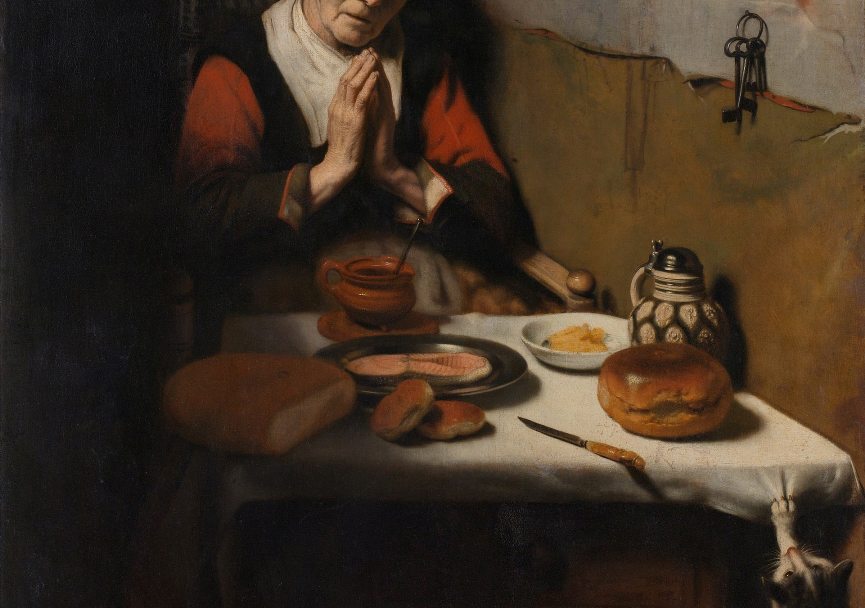Part 2 / Matt. 6:9-13What do you want most? What do you desire above all else? When we are asked those questions, we almost instinctively know that there are right and wrong answers. We know that there are things that we are supposed to want, but if we are honest, we would rather have something else. Like a beauty pageant princess, we say that we want world peace, but we would rather have the crown.
Our prayers reveal a lot about our priorities. Jesus said: “For out of the abundance of the heart the mouth speaks.” (Matt. 12:34). Our hearts are idol factories, the chief idol being “self”. Our prayers often reflect a concern for our own interests more than it does a reverence for God. We ask God to serve our idols and then we are surprised when God says, “No!” No, when Jesus taught his disciples how to pray, he showed them where every true prayer starts. Where true prayer starts After addressing his heavenly Father, assuming the proper posture of respect and trust, Jesus prays: “hallowed be your name. Your kingdom come, your will be done, on earth as it is in heaven.” (Matt. 6:9-10). This is not how we usually start our shopping list of prayer requests! What do these requests have in common? Their primary concern is God’s glory, kingdom, and purposes. The prayer that Jesus taught his disciples first focusses on what God wants, before it turns to our needs and wants. This is foreign to our modern minds. We live in a world that constantly tells us that we deserve to have our every need met and our every desire fulfilled. We approach our spiritual lives in much the same way. We look for churches where our felt needs are met. We volunteer only the surplus of our time, talent, or resources. Our prayers sound more like a reading from our Christmas Wishlist than fellowship with our heavenly Father. Something has to change. We need to reprioritize. The apostle John helpfully points out what our priority should be: “And this is the confidence that we have toward him, that if we ask anything according to his will he hears us. And if we know that he hears us in whatever we ask, we know that we have the requests that we have asked of him.” (1 John 5:14-15). One of the reasons why our prayers seem so powerless, is because we do not “ask according to his will”. Maybe we need an armband that says “WWJP”: What Would Jesus Pray. Praying according to the will of God What is God’s will? I have often heard believers say that it is impossible to know the will of God without a voice from heaven or a vision. It is true that God has not revealed everything to his children. Deut. 29:29 does say: “The secret things belong to the LORD our God”). But he has revealed enough; the rest of Deut. 29:29 reads: “but the things that are revealed belong to us and to our children forever, that we may do all the words of this law.” If this were not true, then Paul’s admonition would make no sense: “do not be foolish, but understand what the will of the Lord is.” (Eph. 5:17). God’s will is revealed in the commands, promises, and prayers of God’s Word. For example, 1 Thess. 4:3 tells us “this is the will of God, your sanctification: that you abstain from sexual immorality”. That is pretty clear. How often do we pray for our sanctification and purity? Our problem is not that God has hidden his will, but rather that we have not paid attention to what he has revealed. So let me ask again: What Would Jesus Pray? Hallowed be your name The first request or petition is found in Matt. 6:9: “hallowed be your name”. We do not put much stock in names nowadays. We rarely think about what they mean or represent. Maybe you’ve read about actors naming their children strange things like “Pilot Inspector” or “Moon Unit”. I shudder to think of the playground insults that their kids will have to endure. Biblical names meant something. This does not mean that some of them weren’t strange. Isaiah called one of his sons Maher-shalal-hash-baz after all, but even this strange name meant something: “hasting to the spoil, hurrying to the prey” (Isa. 8:3). This name was chosen to symbolize Assyria’s mad lust for conquest. Even here the name had meaning. Think of how many times the Lord changed someone’s name to signal a significant change in their lives: Abram became Abraham; Sarai became Sarah; Jacob became Israel; Simon was called Cephas or Peter. These new names came to represent a new identity, or if you want to use gospel language, a new person: “he is a new creation” (2 Cor. 5:17). Similarly, God’s name is significant. For example, in Acts 4:12 we are told that “there is salvation in no one else, for there is no other name under heaven given among men by which we must be saved.” Later we are told that the disciples rejoiced that they were counted worthy to suffer dishonour for the name (Acts 5:41). God’s name represents God as he has made himself known. Herman Bavink wrote: “There is an intimate link between God and his name... We do not name God; he names himself… The name is God himself as he reveals himself”. This means that when Jesus instructs his disciples to pray, “hallowed be your name,” he has God’s person, being, character, and work in mind. God’s name, as a revelation of God, is great (Ezek. 36:23), holy (Ezek. 36:20), and awesome (Ps. 111:9). That is why it must be “hallowed”. But what does “hallowed” mean? The word means to regard as holy or set apart. In asking for God’s name to be hallowed, we are asking that God’s name would be set apart from every other name. Wayne Mack explains: “we pray for God to be regarded in a different way from everyone else”. When Nadab and Abihu, the sons of Aaron, offered unauthorized fire before the LORD, fire came out from before the LORD and consumed them. Moses then said to Aaron, "This is what the LORD has said, 'Among those who are near me I will be sanctified, and before all the people I will be glorified.'” (Lev. 10:1-3). God should not be approached or regarded like pagan idols, nor should he be treated as though he were just one of us. That is why God’s name should be hallowed – it is to give God as he has revealed himself respect, honour, and glory. Praying for his name to be hallowed means that we implore God to help us honour him and that other’s would do the same. Conclusion Commenting on the Lord’s prayer, Martin Llyoyd-Jones wrote: “The word hallowed means to sanctify or revere, to make and keep holy. Why does He say, ‘Hallowed be Thy name’? What does this term ‘Thy name’ stand for?... ‘Thy name’, in other words, means all that is true of God, all that has been revealed concerning God. That means that God in all his attributes, God in all that He is, in and of Himself, and God in all that He has done and all that He is doing.” What would Jesus pray? He would pray that his Father would receive the glory that is his due. It is this desire that moved Jesus to pray: “not as I will, but as you will” (Matt. 26:39), in the Garden of Gethsemane. It is this same desire for God’s glory that moved the disciples to pray for boldness even under threat of persecution (Acts 4:29). That is the first thing that Jesus taught his disciples to pray: “hallowed be your name”. Part 1 / Matt. 6:9-13 and Luke 11:1-13
Few biblical prayers have attracted as much attention as the prayer that our Lord Jesus Christ taught his disciples. “The Lord’s prayer” (as it has become known) has also been called the “Pater Noster” (which is Latin for Our Father). The prayer is recorded in Matthew 6 and in Luke 11. There are slight differences between the two and the setting seems to be different as well. This would suggest that Jesus taught this prayer (or a variation of it) to his disciples on several occasions. The setting recorded in Luke 11 is particularly interesting. Luke 11:1 tells us that “Jesus was praying in a certain place, and when he finished, one of his disciples said to him, "Lord, teach us to pray, as John taught his disciples."” The Incarnate Christ prayed… a lot. This was not particularly unique. The Pharisees prayed a lot as well, and they did so in public. Jesus warns against turning prayer into a public spectacle right before he teaches his disciples how to pray in Matthew 6:5. So what was it about Jesus’ prayers that prompted the disciples to ask: “Lord, teach us to pray”? Jesus’ prayers were private moments of intimate communion with his Father. Jesus did pray out loud and in public on the odd occasion (for example, at the tomb of Lazarus in John 11:41-42). Most of his prayers, however, were private. Mark describes Jesus’ normal pattern like this: “And rising very early in the morning, while it was still dark, he departed and went out to a desolate place, and there he prayed.” (Mark 1:35). The disciples, who were close to Jesus, were aware of this. They saw something in Christ’s prayer-life that they did not see with the Pharisees. They heard something in the prayers of Jesus that they had not heard before. And they wanted in… they wanted to pray like that. They wanted fellowship with the Father like Jesus. What did Jesus teach them? Jesus taught them a pattern for prayer. The differences between Matthew and Luke’s versions remind us that this is not some magic spell. There is nothing particularly powerful about reciting it word for word. Crocheting it on a pillow does not make you spiritual. You can pray the Lord’s prayer verbatim, but if you don’t pray with a sincere faith the words are meaningless. If you do not have a relationship with the Father, you have no right to address him as such. Which brings us to the first part of the prayer: “Our Father in heaven” (Matt. 6:9). That is where we will be spending the rest of our time today. Addressing our Father Quick question: was Jesus the first Person to call God Father? Jesus’s assertion that God was his Father first occurred in a debate about the Sabbath. Jesus claimed that it was proper for him to perform healings on the Sabbath because, in his words: “My Father is working until now, and I am working” (John 5:17). In other words, although God rested on the seventh day from his work of creation, his work of preservation and ultimately of redemption was still ongoing. Moreover, Jesus associated his own ministry with that continuing work of the Father, raising the question of their relationship in a way that antagonized his fellow Jews. As the Gospel records: “That was why the Jews were seeking all the more to kill him, because not only was he breaking the Sabbath, but he was even calling God his own Father, making himself equal with God” (John 5:18). Was their reaction justified? The Old Testament seldom uses the word Father as a description of God, but there are a few occasions where it does so. For example, Isa. 63:16-17 reads: “You are our Father, though Abraham does not know us and Israel does not acknowledge us; you, O Lord, are our Father, our Redeemer from old is your name”. And in the next chapter of Isaiah we read: “O Lord, you are our Father; we are the clay and you are our potter; we are all the work of your hand. Be not so terribly angry, O Lord, and remember not iniquity forever” (Isa. 64:8–9). At first it appears that Isaiah was calling God Father because he was Israel’s Creator, but it is not that simple. God is the Creator of every human being, not just of Israel, but he had not established a covenant relationship with everyone. Israel’s connection to God was something special, and different from what could be said about the entire human race. For Isaiah to call God Father was to acknowledge a particular relationship with him. In these verses, God is addressed as Father, not because he is Israel’s Creator, but because he is its Redeemer. You find something similar in Deut. 14:1-2: “You are the sons of the Lord your God … For you are a people holy to the Lord your God, and the Lord has chosen you to be a people for his treasured possession, out of all the peoples who are on the face of the earth.” And again in Psalm 103:13: “As a father shows compassion to his children, so the Lord shows compassion to those who fear him”. God was their Father through redemption. They were brought into this unique relationship with God because of God’s saving work. Israel, as a nation, did call God “Father” on occasion because of his covenant relationship with his OT people, but this was not something that the individual claimed, nor was it the way common Jews addressed God. So, when Jesus taught his disciples to pray, he was instructing them to relate to God in an intimate and personal way. This was new! Relating to God as Father Christians know God as Father. In the words of JI Packer: “If you want to judge how well a person understands Christianity, find out how much he makes of the thought of being God’s child, and having God as his Father. If this is not the thought that prompts and controls his worship and prayers and his whole outlook on life, it means that he does not understand Christianity very well at all… “Father” is the Christian name for God.” We are encouraged to pray to the Father and enabled to do so because, through faith, the Son has united us to him in his death and resurrection (Gal. 2:20). This union with Christ means that God has made us Christ’s “brothers” (Rom. 8:29). Of course, we are not like Jesus in every respect. He is the divine and sinless Son of the Father by nature, whereas we are sinners who have been adopted by grace through faith in him. After his resurrection, Jesus told Mary Magdalene: “Do not cling to me, for I have not yet ascended to the Father; but go to my brothers and say to them, “I am ascending to my Father and your Father, to my God and your God”” (John 20:17). We are not children of God by nature, but we are by grace. To help us understand, experience, and live out this new relationship which is ours in the gospel, God has given his children the Holy Spirit. Paul describes it like this: “Because you are sons, God has sent the Spirit of his Son into our hearts, crying “Abba, Father!” So you are no longer a slave, but a son, and if a son, then an heir through God” (Gal. 4:6–7). Conclusion The opening line of the Lord’s prayer sets the stage for what follows. It frames the whole prayer. For the believer, prayer means approaching your heavenly Father. Jesus explained it like this: “If you then, who are evil, know how to give good gifts to your children, how much more will your Father who is in heaven give good things to those who ask him!” (Matt. 7:11). Even fallible human fathers want to do good to their children; how much more our perfectly good heavenly Father! Question 120 of the Heidelberg Catechism asks: “Why did Christ command us to call God ‘our Father’?” The answer? “To awaken in us at the very beginning of our prayer that childlike reverence for and trust in God, which are to be the ground of our prayer, namely, that God has become our Father through Christ, and will much less deny us what we ask of Him in faith than our parents refuse us earthly things.” This is where true prayer starts: “Our Father in heaven” Yesterday we saw that the apostle Paul admonished the Ephesian believers to “walk, not as unwise but as wise, making the best use of the time” (Eph. 5:15-16). Time is precious. We have a wonderful illustration of this in antiquity. Kairos was the Greek god “of the fleeting moment”. There was a well-known bronze statue of Kairos by a Greek sculptor named Lysippos. It depicted Kairos with wings on his feet, a bushy lock of hair on his forehead and a bald spot on the back of his head. The epigram on this famous statue explained its meaning: “Who are you? Time and opportunity… why do you have a pair of wings on your feet? I fly with the wind… why does your hair hang over your face? For him who meets me to take me by the forelock… why is the back of your head bald? Because none whom I have once raced by on my winged feet will now… take hold of me from behind.” Some opportunities come by only once in a lifetime; we should, in the words of the apostle Paul, make “the best use of the time”.
This brings us back to Ephesians 5:15-20. How should we redeem the time that we have been given? We have already seen that wisdom will “understand what the will of the Lord is” (v. 17). This calls for time in God’s Word. We have also seen that wisdom will “not get drunk with wine, but be filled with the Spirit, addressing one another in psalms and hymns and spiritual songs, singing and making melody to the Lord with your heart” (v. 18-19). This calls for worship. The final component that Paul points out, is gratitude. Verse 20 explains that a Spirit-filled life will not only worship, but also give “thanks always and for everything to God the Father in the name of the Lord Jesus Christ”. Dr. Paul Hartwig highlights three essential elements of Christian gratitude found in this passage: it is perpetual, universal, and evangelical. Let us look at each of these in turn. Perpetual Verse 20 says that we should be “giving thanks always”. Gratitude should be our constant, consistent, and continuous response to the providence of God. Giving thanks to God should not be an event, but a lifestyle. 1 Thess. 5:18 puts it beautifully: “give thanks in all circumstances; for this is the will of God in Christ Jesus for you.” Universal Verse 20 continues by explaining that such perpetual gratitude is only possible if we understand that God should be thanked “for everything”. Some might object and say that God should be thanked in everything, but not for everything. The text, however, is clear: God should be thanked for everything. Nothing is excluded, good or bad, desirable or undesirable. How can we thank God for everything? Consider this: if God is in control, and if God is good, whatever God ordains will be for our blessing and his glory. Romans 8:28 says: “we know that for those who love God all things work together for good, for those who are called according to his purpose.” This does not mean that I understand all of God’s purposes, nor does it mean that I immediately experience the blessing. Giving thanks for everything means that I trust my sovereign heavenly Father, even when I don’t understand his ways. Evangelical This is what makes our gratitude uniquely Christian: “in the name of our Lord Jesus Christ” (v. 20). The cross of the Lord Jesus Christ, the gospel, gives us the perspective and the basis for such gratitude. It is because we know that God used the tragedy of the cross to bring hope to sinful men, that we can be grateful for everything. God took Jesus to Calvary and he, “for the joy that was set before him endured the cross” (Heb. 12:2). Moreover, we bring our gratitude to God the Father in the “name of our Lord Jesus Christ”. We cannot do this on our own. Our thoughts need to be shaped by the gospel of Jesus Christ. Our prayers need to rest on the grace of Jesus Christ. Our gratitude needs to be empowered by the glory of Jesus Christ. This is how Christians respond in adversity. The apostle Paul instructed the believers in Ephesus to do this while he was imprisoned in Rome. He wasn’t a fair-weather Christian, but a believer who knew how to walk in wisdom, making the best use of the time, worshiping and thanking God in the power of the Spirit and in the Name of the Lord Jesus Christ. What will you do with this opportunity? Because of Christ, Pastor Pieter When the president announced a 21 day national lockdown starting on the 26th of March 2020, many people panicked. Stores were swarmed with anxious buyers and travellers hurried to get home as the country prepared to effectively shut down. Immediately people began counting the days, myself included. The initial lockdown would have ended on Friday, the 17th of April 2020, but on the eve of Good Friday the president announced that the lockdown would be extended to the end of April.
How should Christians respond? I’d like to take you to Ephesians 5:15-20. For the next two days we’ll look at this passage together. It won’t answer all our questions, but it will help us make wise decisions and to respond in a God-honouring way. “Look carefully then how you walk, not as unwise but as wise, making the best use of the time, because the days are evil. Therefore do not be foolish, but understand what the will of the Lord is. And do not get drunk with wine, for that is debauchery, but be filled with the Spirit, addressing one another in psalms and hymns and spiritual songs, singing and making melody to the Lord with all your heart, giving thanks always and for everything to God the Father in the name of our Lord Jesus Christ”. The apostle Paul began Ephesians 5 with a simple, but profound call: “be imitators of God” (v. 1). How could we possibly imitate God? In most respects we can’t, but Paul does mention three things in this chapter that we can imitate. The first is love – God’s love being made visible in the Lord Jesus Christ (v. 1-7). The second is holiness – God’s holiness being made visible in a life of light (v. 8-14). The third is wisdom. Verse 15 says: “Look carefully then how you walk, not as unwise but as wise”. Wisdom, God’s wisdom, is not something that comes naturally to man, because we are born separated from God and our hearts are naturally inclined against him (Eph. 2:3). We are born fools. In chapter 4:17-18 Paul describes the unconverted as walking in “the futility of their minds” and says that they are “darkened in their understanding, alienated from the life of God”. Outside of God’s redeeming grace in Jesus Christ humanity is foolish. So where do we get the wisdom we so desperately need? Wisdom is found in the Lord, who is himself the Author of wisdom. To gain such wisdom, and to grow in it, we must fear the Lord (Proverbs 9:10), study his Word (Psalm 119:99) and pray (James 1:5). And we now have the time to do it. Note what Paul says in verse 16: “making the best use of the time, because the days are evil.” Wisdom understands that time is precious and that we only have a finite amount of it. In Psalm 90:12 Moses prays: “So teach us to number our days that we may get a heart of wisdom.” Let’s do that. We have 168 hours in our seven-day week. Roughly a third of those 168 hours should be devoted to rest and sleep – around 8 hours a day. That leaves us with 112 hours. With many of us either working from home or not working at all, balancing those 112 hours becomes very difficult. By now many of us may have run out of projects that needed to be done around the house. You can only Spring clean your house so many times. What should we do with the remaining hours? If we are to be imitators of God (v. 1) and if we should “walk… as wise” (v. 15), our priorities will be shaped by the Lord and his Word. Verse 17 says: “Therefore do not be foolish, but understand what the will of the Lord is.” To know what the will of the Lord is, we need to spend time in the Word. One of the complaints I hear often is that people don’t have the time to really study God’s Word. They squeeze it in here and there, but they don’t have time to really read and meditate through God’s Word. But we do now. Another priority that you’ll pick up is worship. Verse 18-19 contrasts the drunken revelry of the world with the Spirit-filled worship of the church: “addressing one another in psalms, hymns and spiritual songs, singing and making melody to the Lord with your heart”. When we spend time in God’s Word, where God speaks to us, it moves us to respond. When the Word convicts us of sin, we respond with prayerful contrition and repentance. When the Word reveals the glories of God, we respond with praise and adoration. The Psalms are a wonderful refuge in this time, as are those songs and hymns that have stood the test of time. Let them be the “background music” of your lockdown. Tomorrow we’ll look at the last part of this passage. For now, remember to “walk, not as unwise but as wise, making the best use of the time”. Because of Christ, Pastor Pieter On the 19th of February 1948 Romanian pastor Richard Wurmbrand was arrested on his way to church. His only crime was shepherding his flock and witnessing to others about his faith. He would spend 14 years in jail. His sole comfort, when all contact with family and friends was cut off, was the Word. Night after night he would console himself with verses stored away in his memory – something his communist captors could not take from him.
Stories like these illustrate the importance of memorizing Scripture. Here are five reasons every believer should memorize Scripture:
You may not live under the threat of persecution, but that does not diminish your need for God’s Word. Dallas Willard wrote: “As a pastor, teacher, and counsellor I have repeatedly seen the transformation of inner and outer life that comes simply from memorization and meditation upon Scripture.” So, which passage will you memorize first? Because of Christ, Pastor Pieter Hear me out. What makes you get up early on a Sunday morning, get dressed, and drive to church? You may enjoy the music, the atmosphere or the coffee. Maybe you come for the youth program. Your friends may be at this church. You might even enjoy the preaching. These aren’t bad motivations, but on their own they aren’t enough.
What happens when you don’t have friends at church, the youth program isn’t running, and the coffee is bad? Do you stay in bed? There should be more to our church commitment than preferences and personalities. What should bring us to church? Love for Christ: Jesus said that if we love him, we will keep his commandments (John 14:15). His Word commands us not to neglect meeting together (Heb. 10:25). His Word also reminds us that if we love him, we will love his people (see 1 John 4:20). You can’t love Christ by avoiding his people. Love for his Word: When the church gathers it does so in obedience to the Word and to be instructed in the Word. The early church devoted themselves to “the apostles’ teaching” (Acts 2:42). Paul sought to instruct the church in the “whole counsel of God” (Acts 20:27). He also commanded Timothy to “preach the Word” (2 Tim. 4:2). If you believe that the Bible is the sword that the Spirit uses to cut away sin and cultivate godliness (Heb. 4:12), you will want to be where it is preached. Love for the glory of God: There is a reason why we call our it a worship service. The focus of our gathering is the glory of God. We praise God for his character and works (Ps. 103:1-5). We pray for God’s Name to be “hallowed”, his kingdom to come and his will to be done (Matt. 6:9-10). We preach so that his church can grow in their understanding of his glories (1 Cor. 1:23). We proclaim that the world may see his glory (2 Cor. 4:5-6). Sundays help us refocus on what really matters: God’s glory. Love for the body: Because of Christ’s love for us, we love his people (Eph. 4:32). This love is more than mere sentiment; it reveals itself in service. It is not enough to live in passive tolerance of God’s people; Christ calls us to serve them. Gal. 5:23 commands: “through love serve one another.” You’ve received gifts to “serve one another” (1 Pet. 4:10). The members should all “have the same care for one another” (1 Cor. 12:25). Care given and care received – it starts on Sunday. These are just a few biblical motivations; there are others. The question you must answer, is: what brings you to church? Because of Christ, Pastor Pieter There are things that are simply too great for me. They are too great for me to comprehend or control. The plans and purposes of God are mysterious – I simply cannot wrap my head around them. Things happen in the providence of God – I cannot change them. I may wish to understand or strive to control, but ultimately I have to confess that I am just too small. Thankfully, I am not alone.
David had a similar struggle. There were many things that David did not understand and could not control. So what did David do? He relaxed, or more accurately: he rested in the Lord. Note what he says in Psalm 131: “O LORD, my heart is not lifted up; my eyes are not raised too high; I do not occupy myself with things too great and too marvelous for me. But I have calmed and quieted my soul, like a weaned child with its mother; like a weaned child is my soul within me. O Israel, hope in the LORD from this time forth and forevermore.” The Psalm starts with David humbling himself before the Lord. Lifting up your heart or raising your eyes signified pride (v. 1). Instead of overestimating his own abilities, David did “not occupy myself with things to great and too marvelous for me.” This does not mean that David did not wrestle with the Lord or that he was indifferent. David thought great thoughts about God and he did great things for God. But David knew his limits. He understood that some things were just beyond him: beyond his understanding and abilities. In those moments David did not become restless, anxious or frustrated. He “calmed and quieted” his soul (v. 2). How do we do that? He tells us in the final verse: “hope in the LORD” (v. 3). In those moments he rested in God, “like a weaned child with its mother” (v. 2). You don’t understand it all, but God does. You can’t do it all, but God can. What will you do when you are faced with “things too great for me”? Take David’s advice: “hope in the Lord”. Because of Christ, Pastor Pieter Worship is a vital part of our Christian walk. Properly understood, it is the acknowledgement of God’s worth in every sphere of our lives. For the Christian, worship isn't an isolated event that happens on a Sunday morning - it is a lifestyle.
Worship does happen on a Sunday morning. Sometimes, however, even though we attend the service, sing the songs and listen to the sermon we don't experience it as worship. We experience it as drudgery or duty. Why? One possibility is unconfessed sin. We know that God extends forgiveness to those who repent of their sins and trust in Christ. That is how any relationship with the Lord starts, but it is also how it grows. God calls on us to confess our sins as part of our growing relationship with God (see 1 John 1:9). Jesus also taught us to make confession a part of our prayers (Matt. 6:12). Why would we have to confess if we've already been adopted into God's family? Take marriage as an example. When I sin against my wife it does not change the fact that we are married, but it does affect our relationship. Our marital status has not changed, but our experience of the joy, intimacy and trust that should accompany marriage has taken a blow. Confession and forgiveness restores the relationship. Unconfessed sin hardens the heart and hinders worship. David experienced the cold prison of unconfessed sin, but he also experienced restoration: "I acknowledged my sin to you, and I did not cover my iniquity; I said, 'I will confess my transgressions to the LORD,' and you forgave the iniquity of my sin." (Ps. 32:1-5). Jesus Christ became a man, lived a perfect life, died the death that we deserved to die and rose from the dead, thereby securing the forgiveness of sin and eternal life for all who trust in Him. Don't hesitate: confess your sins and rejoice in his forgiveness. Because of Christ, Pastor Pieter What stands in the way of experiencing worship? Worship, properly understood, is the acknowledgement of God’s worth in every sphere of our lives. We've been focussing on one special expression of worship: our Sunday worship service. However, this weekly expression of worship should not, in fact cannot, be divorced from the rest of our lives.
Our Sunday morning worship is just one part of our Christian lives. The rest of our lives should be as committed to acknowledging Christ as our Sunday service is. If that is not the case, the problem is not the service - the problem is us. In James 2:17-20 we are warned that a faith that is not accompanied with works is "dead." True worship calls for a living, vibrant faith and such a faith can only grow in the atmosphere of obedience. A dead faith cannot feel and cannot experience true worship. Peter also alluded to this when he admonished husbands to live with their wives in an understanding way, showing honour to them because they are fellow heirs with them of the grace of life (1 Pet. 3:7). Then he adds this warning: "so that your prayers may not be hindered." Clearly, when husbands do not honour Christ in how they treat their wives, their prayers will be hindered. Again, true worship is hindered by disobedience. Sunday worship happens when believers in the Lord Jesus Christ gather together as the church of Christ, praying, singing, reading and explaining the Word of Christ, obediently conforming to the image of Christ. If we aren't conforming to the image of Christ, if we aren't acknowledging the Word of Christ in our lives, crucial elements of true worship are missing. In short, don't just worship on a Sunday - worship Christ by following him every day of the week. Because of Christ, Pastor Pieter In our last article we started a new series on worship - specifically experiencing worship. Worship, properly understood, is the acknowledgement of God’s worth in every sphere of our lives, but in this series our focus will be on one special expression of worship: our Sunday worship service.
On a Sunday worship happens when believers in the Lord Jesus Christ gather together as the church of Christ, praying, singing, reading and explaining the Word of Christ, obediently conforming to the image of Christ. Christ is at the heart of worship. Which brings us to an important point regarding worship: if we want to experience genuine worship we have to be Christ-centred. In Heb. 13:15 we are told: "Through him then let us continually offer up a sacrifice of praise to God, that is, the fruit of lips that acknowledge his name." Worship acknowledges Christ's name. How do we acknowledge Christ's name? The word translated "acknowledge" above is sometimes translated "confess" or "declare". In 1 John 4:2 it is written: "By this you know the Spirit of God: every spirit that confesses that Jesus Christ has come in the flesh is from God". And in Rom. 10:9 we read: "if you confess with your mouth that Jesus is Lord and believe in your heart that God raised him from the dead, you will be saved." Acknowledging Christ has two aspects. Firstly, it means that we know who Christ is (Jesus Christ has come in the flesh). Secondly, it means that we respond appropriately to him (confess him as Lord). If you really want to experience worship, get to know Jesus better. This is why we strive for Christ-centred preaching and why you should pray for the ministry of the Word here at SBC. Also, as you grow in your knowledge of Christ, ask the Lord how you can properly respond to that knowledge. How does Christ's humanity give you hope? How does Christ's exaltation order your life? What does it mean to confess Christ as Lord? These thoughts are the fuel of true worship. Because of Christ, Pastor Pieter A couple of years ago I was at the Passion conference where 6000 young adults were gathered together, praising God. The stated aim of the conference was to encourage people to worship Christ. It was almost overwhelming: 6000 students sang: “Glory to God, Glory to God, Glory to God, forever”.
God judges the heart, so we’ll leave it to God to judge their sincerity. But it made me wonder: why can’t Sunday services be like that? Most people would blame the service, but that would be dishonest. If we can only experience worship with great music and big crowds the problem might lie elsewhere. The problem might be us. What exactly is worship? Worship in the proper sense is the acknowledgement of God’s worth in all of our lives. But I want to focus on what happens on a Sunday. Worship happens when believers in the Lord Jesus Christ gather together as the church of Christ, praying, singing, reading and explaining the Word of Christ, obediently conforming to the image of Christ. Col. 3:16 states that singing is part of it, but not just singing. Everything in the service should be an act of worship, even the sermon. Worship is the earthly expression of our heavenly vocation: glorifying God and enjoying Him for ever. What needs to happen for us to experience worship in that way? First, we must have a living faith in the Lord Jesus Christ. Deut. 6:4-5 made it clear that only those who love God can truly worship him (see also Ps. 95:6-7). Without faith it is impossible to please God (Heb. 11:6), or truly worship Him. Do you know the God you claim to worship? Have you put your faith in Him and Him alone? That is where true worship starts. Because of Christ, Pastor Pieter Dear Strand Baptist and friends
I want to write a few words to you today about congregational singing; and the godly idea I want to highlight is 'singing psalms and hymns and spiritual songs, with thankfulness in your hearts to God' (Colossians 3: 16). The reason I would like to briefly ponder this verse is because of the fact that in our contemporary Christian culture today the voices of God's people are being drowned out by electronic technical instruments. This biblical injunction needs to be heard afresh today in the light of trends in the church. When Heather and I visit other churches when away from SBC, one of the most startling things is the level of church music. On the Sunday prior to my return to SBC I visited a nearby church, arriving 15 minutes before the service (making sure I practice what I preach!). Though there was not a band, there was some 'foreground' music playing. It was so loud I struggled to hear the people welcoming me and had to nearly shout to be heard! Time and again I have been noticing that a shift has taken place in many churches, where the band is taking the centre stage and the congregation a back stage, the instruments dominating the voices of God's people. Naturally I was glad to be back at SBC! Now, let me say that this is not a sign that I am loosing touch with 'where things are at' today or am just making a personal judgment where there should be liberty and tolerance. No, the fact is that the way of doing church in too many churches is determined more by the culture of the world than the culture of the Word. Congregations are turning into passive audiences instead of active singers. For this reason, I am becoming more and more convicted that congregational singing needs to become the dominant method of music in the church today. Of course that does not mean that instruments are out (or that I am rationalising our present situation at SBC) it just means that music must subordinate itself to the voices of the people of God rather than supplant them. Too often the 'band' has been the tail that wags the dog in congregational singing. I think there needs to be a singing reformation in today's church when God's people will not be happy with the method of music in the church unless the voices of the congregation can be heard above the music. This will reverse the present trend where the style of music becomes the key criteria either for keeping people in a particular church or else for sending them away. It will also facilitate the important biblical (and baptist) conviction that the gathering of God's people is an act of Christ-like active service to all, and not a passive observation by the many of the few. In the open-heaven visions of the book of Revelation, we have many glimpses of angels in heaven singing the praises of God and the Lamb, but no instruments. So, let's begin to prepare for going there and come this Sunday to sing from our heart the high praises of the Lord. Love in Christ, Pastor Paul |
Topics
All
By Date
April 2024
|












